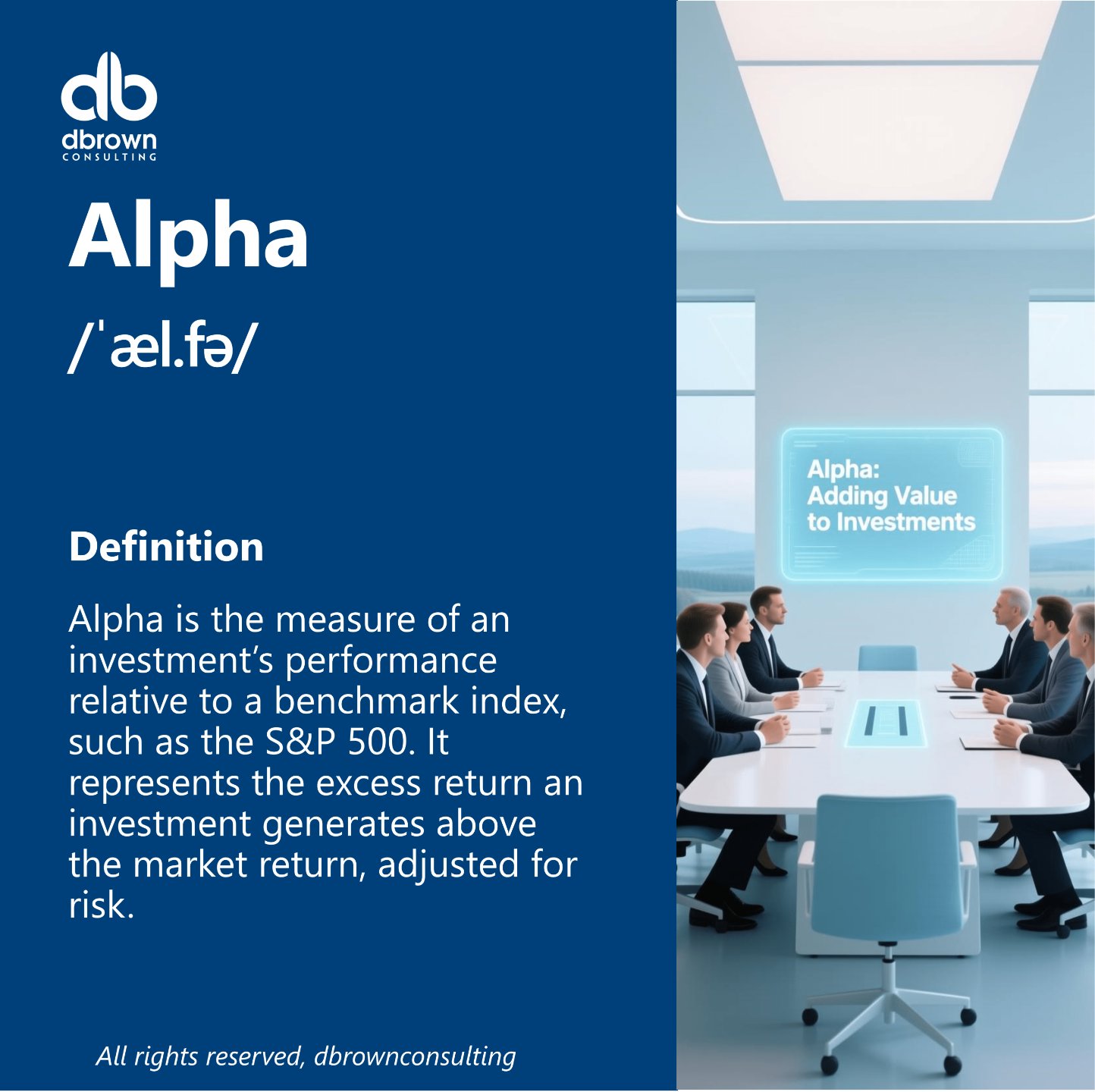ALPHA
Definition
Alpha (α) is a measure of an investment’s excess return relative to a benchmark index, after adjusting for market risk. In other words, it quantifies the value a portfolio manager or investment strategy adds (or subtracts) beyond what would be expected from exposure to systematic market risk (beta).
-
α > 0 → Outperformance relative to the benchmark.
-
α < 0 → Underperformance relative to the benchmark.
-
α = 0 → Performance matches the benchmark, adjusted for risk.
Origins
- From the Greek letter α (alpha), used in statistics and finance to denote a constant or excess factor.
- Popularized in the 1960s with the Capital Asset Pricing Model (CAPM) and later integrated into Jensen’s Alpha, a widely used performance evaluation metric.

Usage
-
Portfolio Management – Measures manager skill beyond market exposure.
-
Hedge Funds – Alpha is central to marketing “absolute return” strategies.
-
Performance Attribution – Separates active return from market-driven returns.
-
Risk-Adjusted Metrics – Used alongside Sharpe Ratio, Beta, and Information Ratio.
-
Quant Investing – Factor-based models often target alpha generation.
How Alpha Works
-
Expected return is calculated using CAPM (based on beta, risk-free rate, and market return).
-
Actual return is compared against this expected return.
-
The difference is alpha—representing value added (or destroyed) by active management.
Types of Alpha
-
Jensen’s Alpha – The classic CAPM-based alpha for performance evaluation.
-
Simple Excess Return – The raw difference between an investment’s return and its benchmark's return, without adjusting for beta.
-
Factor Alpha – Alpha after adjusting for multiple risk factors, such as those in the Fama-French model.
-
Portable Alpha – An investment strategy that seeks to separate a portfolio’s alpha from its beta exposure, allowing the alpha to be combined with a different market exposure.
Key Takeaway
-
Alpha = skill-based performance, beta = market-based performance.
-
Positive alpha = manager skill, negative alpha = value destruction.
-
Heavily used in mutual fund, ETF, and hedge fund analysis.
-
A key indicator for active vs. passive investing debate.

Context in Financial Modeling
-
DCF & Valuation – Alpha used to evaluate expected returns vs. CAPM cost of equity.
-
Portfolio Construction – Allocating capital to managers with consistent alpha.
-
Risk Budgeting – Balancing alpha-seeking strategies with beta exposures.
-
Performance Attribution – Decomposes returns into alpha vs. factor-driven sources.
Nuances & Complexities
-
Persistence problem – Few managers consistently generate positive alpha.
-
Benchmark choice – Alpha depends heavily on the selected benchmark.
-
Factor exposure – Some alpha is actually compensation for hidden risk factors.
-
Market efficiency – In highly efficient markets, sustainable alpha is rare.
Mathematical Formulas
Alpha in CAPM Context
Where:
= Actual return of the asset or portfolio
= Risk-free rate
= Return of the market benchmark
= Sensitivity to market risk
Master Financial Modeling with the FMA
Change your career today by earning a Globally Recognized Accreditation
Develop real-world financial modeling skills, gain industry-recognized expertise, stand out and start earning more by gaining the Advanced Financial Modeler (AFM) designation from the Financial Modeling Institute.
Our expert-led online cohort based program covers everything you need to become a world class financial modeling pro and advance your career in finance.
Related Terms
-
Jensen’s Alpha
-
Information Ratio
-
Efficient Market Hypothesis (EMH)
Real-World Applications
Mutual Fund Analysis – A U.S. equity fund returns 10% while the S&P 500 (adjusted for beta) returns 8%. → Alpha = +2%.
Hedge Fund Strategy – A long/short equity fund posts +5% alpha despite market-neutral positioning.
Underperformance Case – If expected return (via CAPM) = 7%, but fund delivers only 5%, alpha = –2%.
References & Sources
Unlock the Language of Finance!
Elevate your financial acumen with DBrown Consulting’s exclusive newsletter. We break down complex finance terms into clear, actionable insights—empowering you to make smarter decisions in today’s markets.
Subscribe Today & Make Financial Jargon Simple!
We won't send spam. Unsubscribe at any time.

